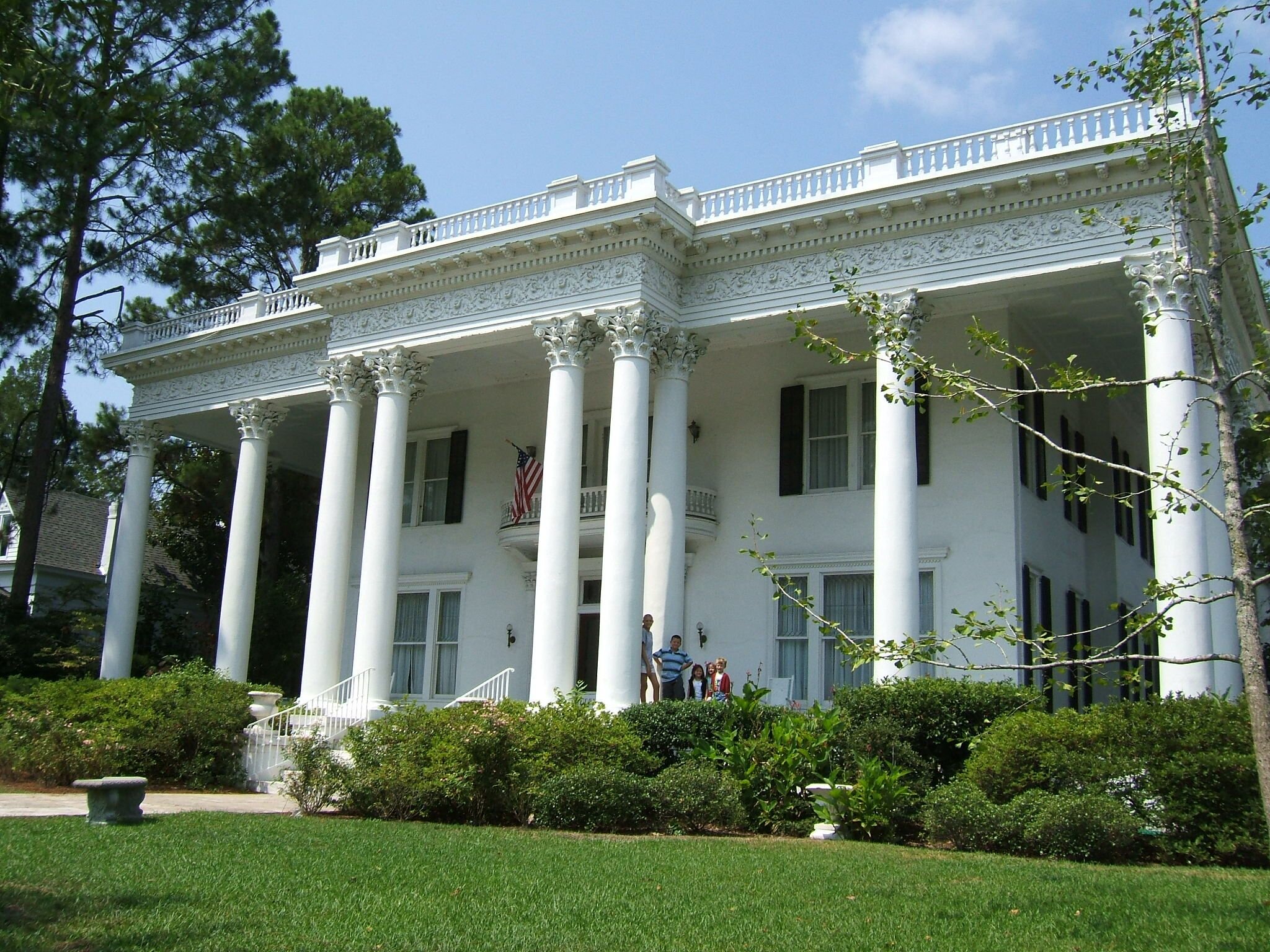


HISTORY
HERITAGE ASSOCIATION
“The Eufaula Heritage Association wasn’t organized, it was born.” L.Y. Dean, III
Charter President of the Eufaula Heritage Association, 1966-1971
It was born because proud Eufaulians have always loved their hometown. When the historic town had lost several antebellum houses, Eufaulians began to worry about the way many of their landmarks were being destroyed to make way for new buildings. Others had been victims of demolition by neglect.
In August of 1965, The Eufaula Tribune announced the Shorter-Upshaw mansion and its furnishings would be sold at auction. Eufaula Mayor Hamp Graves appointed a committee to investigate the possibility of purchasing the Mansion as a city Civic Center. Joel P. Smith Sr., chairman, served along with Florence Foy Strang, Ben Reeves, Willard Smith, Wade Perry, Neal Logue, Donald Comer III, and Bill Roberts. The committee quickly obtained pledges from people in the community and purchased the showplace for $33,000. As a banker and charter president, L.Y. Dean, III played a key role, as did other concerned Eufaula citizens, in beginning the renowned historic preservation movement in Eufaula.
This dramatic, spontaneous action at the auction showed the quality of citizenship and leadership that set the Bluff City of the Chattahoochee apart. Saving the architectural masterpiece also sparked formation of the Eufaula Heritage Association and organizing and promoting the Eufaula Pilgrimage in 1965 as an annual fundraiser.
For more than 40 years Shorter Mansion has served as a museum, social, and cultural center for the people of Eufaula and the surrounding area. The Eufaula Heritage Association uses the Mansion as its headquarters in helping preserve historic Eufaula and promoting the annual Pilgrimage and Christmas Tour, added in 2006. The “beautiful, white house with the large columns” is visited by tourists, groups, and can be rented for weddings, parties and other events.
Information taken from Joel Smith’s book, “A Brief History of Shorter Mansion and the Eufaula Heritage Association”, published 2007 by the Eufaula Heritage Association.
SHORTER MANSION
The Mansion began as a more humble home built in 1884, by Eli Sims Shorter II (1858 - 1908) and his wife Wileyna Lamar (1861 - 1927) of Macon, Georgia. An extensive renovation, began in 1901 and lasting through 1906, transformed it into the outstanding Greek Revival Mansion it is today, enabling it to be listed on the National Register. Eli and Wileyna had three children and were well respected in the community.
The Mansion was a social center for the small town. After Eli's death, just two years after the renovation, Wileyna continued living there until 1927, when the home was passed to daughter Fannie S. Upshaw. The home was passed to her daughter, Wileyna S. Kennedy, in 1959. Because of health reasons, Wileyna's family moved away from Eufaula and the Mansion suffered neglect.
In 1965, Wileyna put the home up for public auction. A group of civic-minded citizens organized the Eufaula Heritage Association and were able to buy the Mansion at this auction for $33,000. A state grant of $75,000 was awarded the Heritage Association to honor six governors of the State of Alabama from Barbour County. This grant was used for the purchasing of antique furnishings for the Mansion and making it a house museum and cultural center open to the public. The home was refurnished by a decorator and donations. Plans were soon in place for an annual Pilgrimage tour of other historic homes in Eufaula to offset the cost of maintaining the house and to have the resources necessary to pursue an active preservation effort.
The first Eufaula Pilgrimage was held April 11 - 17, 1966. David Kennedy, great grandson of the builder, continues to be involved with the Mansion, having shared memorabilia and memories that add to the overall history of this great place, home to many weddings, receptions, teas, and other special occasions.
EUFAULA, AL
Since at least 1733, the site along the Chattahoochee River that is now Eufaula was occupied by three Creek Indian tribes of the Muscogee Nation. One of these was "the Eufaulas" (pronounced you-fall-uhs). It is speculated that the name means "high bluff" in the Creek language, referring to the embankments overlooking the river. In 1823, men from Georgia, looking for fertile crop land, established a permanent white settlement on these high bluffs and adopted the Creek village's name.
Major General William Irwin, who served with an Alabama militia unit during the Creek War of 1836-37, was granted several thousand acres of land in nearby Henry County. He was one of the most prosperous men in the area and served as its first state senator. With his influence, he promoted the area's development and established the first steamboat wharf along Eufaula’s high bluffs. This set the stage for the towns rise to prominence as a center of trading. In his honor, Eufaula became "Irwinton."
Attracted by the area’s rich soil, and further encouraged by the opening of the Federal Road, white settlers swarmed into the area. In the Treaty of Cusseta, 1832, the Creeks ceded their land rights in the area, and Barbour County was incorporated.
In 1834, Captain Seth Lore and others developed what is now the downtown area, naming the four main north-south avenues "Livingston," "Orange," "Randolph," and "Eufaula" (L-O-R-E). The Seth Lore and Irwinton Historic District now encompasses much of the oldest part of the city. In 1843, the town was renamed "Eufaula," because mail was constantly being misdirected to Irwinton, Georgia.
The town became a major shipping and trading point for surrounding counties in Georgia and Alabama. Its many impressive antebellum homes and businesses attest to the wealth and culture of the period. Eufaula became politically powerful, and the "Eufaula Regency" supported secession. Six companies from throughout Barbour County fought for the Confederacy as far away as Virginia. One of the governors of war-time Alabama was a Eufaulian, John Gill Shorter.
Following the fall of Montgomery to Union troops, Eufaulians could only wait for the worst. On April 29, 1865, a messenger galloped in with news that General Benjamin H. Grierson, commanding 4000 Union calvarymen, was approaching from Clayton to the west. Under a flag of truce, mayor Dr. C.J. Pope and other prominent citizens met the general beyond College Hill with the news, received from river traffic, that Johnston had surrendered to Sherman. Lee had already surrendered at Appomattox Courthouse. The war was over. The troops marched peacefully across the river to camp in Georgetown, Georgia. Dr. and Mrs. Pope entertained the general and his staff at dinner. Eufaula remained intact, her people unharmed.
Following the war, the town’s fortunes suffered from the loss of plantation-produced cotton and Reconstruction. But by the 1880s, Eufaula was booming again with cotton mills and railways becoming important and remaining so until the 1960s. In 1963, the Army Corps of Engineers' creation of Lake Walter F. George (also known as Lake Eufaula) behind the lock and dam at Fort Gaines, Georgia, once again assured Eufaula’s importance as an inland port.
The Eufaula Heritage Association was formed in 1965 to prevent the loss and destruction of the town’s historic treasures. The Association purchased Shorter Mansion at auction, and made it the headquarters for both the Association and the annual Eufaula Pilgrimage. A museum honoring the six Alabama governors from Barbour County, as well as Admiral Thomas Moorer, a former Chairman of the joint Chiefs of Staff, is located there. The Seth Lore and Irwinton Historic District has become the largest in East Alabama and second-largest in Alabama. The town boasts over 700 structures listed on the National Register of Historic Places.
Many industries and businesses have recently located in Eufaula, attracted by the area’s natural resources, work force, and good schools. Tourism thrives. Drawn by "Lake Eufaula’s" reputation as a bass fishing mecca, the area’s temperate climate, the town’s historic and natural beauty, and the hospitality of its citizens, many people from around the world come to stay for a week, a season, or a lifetime.
Eufaula boasts many structures listed on the National Register of Historic Places.